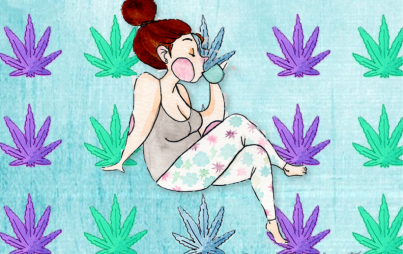
With some of the most lax cannabis laws in the world, teens in the Netherlands are not that excited about weed.
Let me start with a confession: I am terrified of teenagers. I’m particularly petrified of having some of my own. At four, six, and seven, my kids are a few years away from adolescence, but I can’t stop thinking about it, just in case. As the saying goes, it’s better to be safe than sorry. I remember my teenage years as one long phase of sadness, with a healthy dose of drama to boot. Needless to say, I’d rather help my kids avoid such a fate. But as it turns out, maybe I don’t need to worry after all.
I live in the Netherlands, a country with an extremely lax approach to taboo topics such as prostitution, drugs, and teenage sex. Now you’d think, isn’t that a bad thing? And what do drugs have to do with parenting teens? As it turns out: everything.
Dutch teenagers are less likely to smoke, drink, or have sex than their counterparts in other countries. The rate of teenage pregnancy is among the lowest in the world. According to Dutch News, fewer than five per 1,000 of 15 to 19-year-old girls give birth per year, and teenage abortion rates are also very low. One reason is the openness in communication between parents and their children. Dutch parents talk frankly to their children about difficult topics such as drugs, and they do so without cringing.
As for me, I am keeping an eye on Dutch teenagers because I am fascinated (and, as mentioned, more than just a little terrified) by them. Each time I see Dutch teens, I stop and try to take a moment to observe their behaviour, just to know what to prepare for. And I must admit that I like what I see. These kids are not afraid to voice their opinions. Dutch boys and girls play together without any problems. They ride their bikes with a grace I wish I possessed now, and seem to feel at home in their bodies.
The Dutch have the same lax approach to raising kids as they do to drugs. First, introduce some ground rules. (The Dutch are actually very keen on rules.) But otherwise, let these poor kids be. And, as a parent, it’s important to keep an open line of communication with your kids.
They don’t seem to be as self-involved as I used to be when I was a teenager. On the contrary, they are considerate and ready to lend a hand. Once, I saw a teenage girl enter the tram I was riding. She approached the lady sitting opposite of me and calmly but confidently asked that lady to move her bag so that she could sit down.
I was heartened by the young woman’s confidence. At her age, I’d have never asked anyone anything. I wouldn’t have dared. All I wanted to do was to become invisible. Asking that woman to move her bag would have required actually talking to her, and conversation has never been my strongest point. Standing was the preferable option. I was in awe of that girl.
Teens in the Netherlands seem to have their lives together, and like most Dutch kids, they seem incredibly content.
A recent book claims that Dutch kids, including teens, were the happiest in the world. Some reasons given: open communication between parents and kids, less schoolwork, and more independence.
But you may still be asking what that might have to do with cannabis? The answer is simple. The Dutch have the same lax approach to raising kids as they do to drugs. First, introduce some ground rules. (The Dutch are actually very keen on rules.) But otherwise, let these poor kids be. And, as a parent, it’s important to keep an open line of communication with your kids.
I often see Dutch teens walking hand in hand with their parents, or whole families with two or three adolescents at a restaurant talking, laughing, and enjoying their meals. Of course, there could have been a huge teenage meltdown seconds before, but I think this seemingly too-good-to-be-true scene is actually the norm here.
There appears to be very little inter-generational conflict. Parents talk to their teens, but they also put a lot of trust in them. Mothers and fathers can rest assured their kids won’t do anything dangerous and that they’ll take responsibility for their own safety and actions. I also see Dutch parents with kids of all ages practicing positive encouragement, through comments like “Goed zo!” (Well done!) They seem to avoid saying “No,” and rely on setting boundaries rather than doling out punishment.
In the U.S., many parents say that cannabis made them so much better at raising their children. In the Netherlands, it’s true as well, but in a different way. Instead of forbidding it, the Dutch make it as boring as possible.
As my brother once said, “Why would you want to rebel when you’re allowed to do anything?” When everything is allowed (under some rather strict rules and regulations), rebelling just doesn’t make sense.
These rules should be worked out with the child, with both parts agreeing that they are reasonable. Dutch parents create “zones of order” in which teenage experimentation is tolerated, but monitored and controlled by their parents (for example, by allowing them to have sex at home). “The Netherlands has done everything humanly possible to make teen sex and drugs seem dull,” writes Simon Kuper in the Financial Times. And that’s exactly the case. Tourists are the only ones who seem overly excited about cannabis here.
Dutch parents also don’t worry about binge drinking or drug use. And, the already low number of teens in the Netherlands who indulge in substance abuse is actually falling. In 2011, 19 percent of boys and 14 percent of girls tried cannabis. Judging from the relative ease of access to drugs, you’d expect this number to be much higher. When you consider that cannabis is off-limits to kids under 18 years old, and that it’s illegal to open a shop within 250 meters of a school, these numbers make sense. But parenting definitely plays a role as well.
The longer I live here, the more I think that the Dutch approach to cannabis directly translates into happy teens. It’s a paradox, but it’s true. Maybe I should stop worrying and instead simply keep an open communication line with the kids. And hope that some of the Dutchness will rub off on them.







